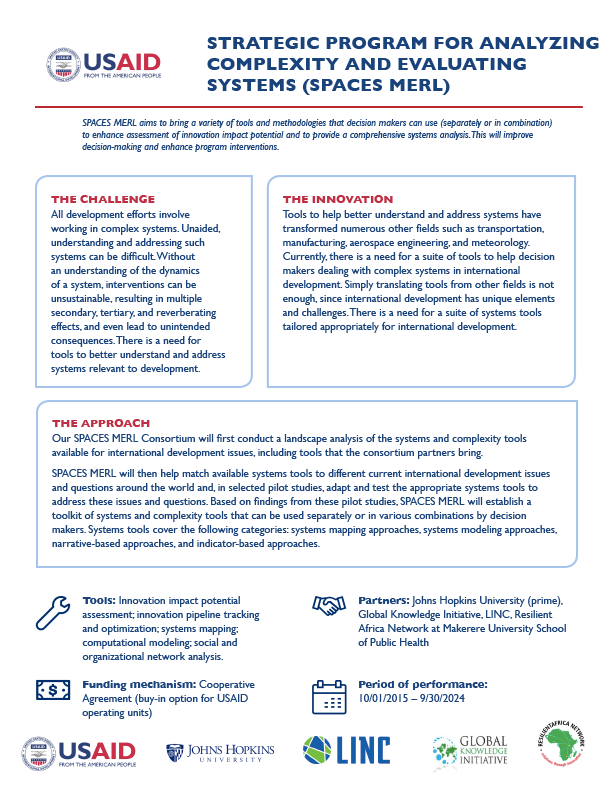- What We Do
- Agriculture and Food Security
- Democracy, Human Rights and Governance
- Economic Growth and Trade
- Education
- Environment and Global Climate Change
- Gender Equality and Women's Empowerment
- Global Health
- Humanitarian Assistance
- Transformation at USAID
- Water and Sanitation
- Working in Crises and Conflict
- U.S. Global Development Lab
Speeches Shim
SPACES MERL aims to bring a variety of tools and methodologies that decision makers can use (alone or in combination) to enhance assessment of innovation impact potential and to provide a comprehensive systems analysis. This will improve decision-making and enhance program interventions.
THE CHALLENGE
All development efforts involve working in complex systems. Unaided, understanding and addressing such systems can be difficult. Without an understanding of the dynamics of a system, interventions can be unsustainable, result in multiple secondary, tertiary, and reverberating effects, and even lead to unintended consequences. There is a need for tools to better understand and address systems relevant to development.
THE INNOVATION
Tools to help better understand and address systems have transformed numerous other fields such as transportation, manufacturing, aerospace engineering, and meteorology. Currently, there is a need for a suite of tools to help decision makers dealing with complex systems in international development. Simply translating tools from other fields is not enough, since international development has unique elements and challenges. There is a need for a suite of systems tools tailored appropriately for international development.
THE APPROACH
Our SPACES MERL Consortium will first conduct a landscape analysis of the systems and complexity tools available for international development issues, including tools that the consortium partners bring.SPACES MERL will then help match available systems tools to different current international development issues and questions around the world and, in selected pilot studies, adapt and test the appropriate systems tools to address these issues and questions. Based on findings from these pilot studies, SPACES MERL will establish a toolkit of systems and complexity tools that can be used separately or in various combinations by decision makers. Systems tools cover the following categories: systems mapping approaches, systems modeling approaches, narrative based approaches and indicator-based approaches.
QUICK FACTS
- Tools: Innovation impact potential assessment; innovation pipeline tracking and optimization; systems mapping; computational modeling; social and organizational network analysis.
- Funding mechanism: Cooperative Agreement (buy-in option for USAID operating units)
- Partners: Global Obesity Prevention Center at Johns Hopkins University (prime), Global Knowledge Initiative, LINC, Resilient Africa Network at Makerere University School of Public Health
- Period of Performance: 10/01/2015 – 9/30/2024


Comment
Make a general inquiry or suggest an improvement.